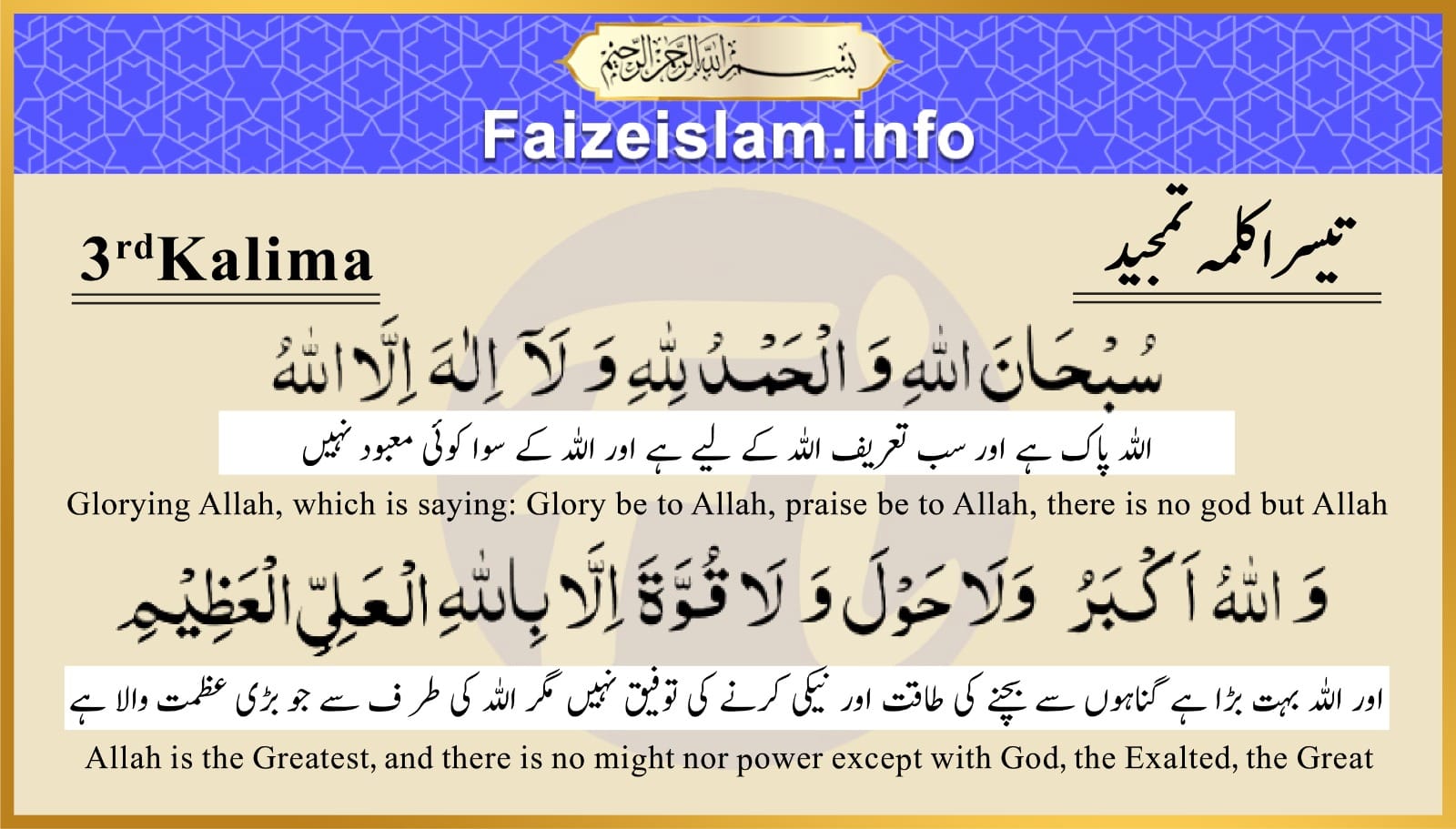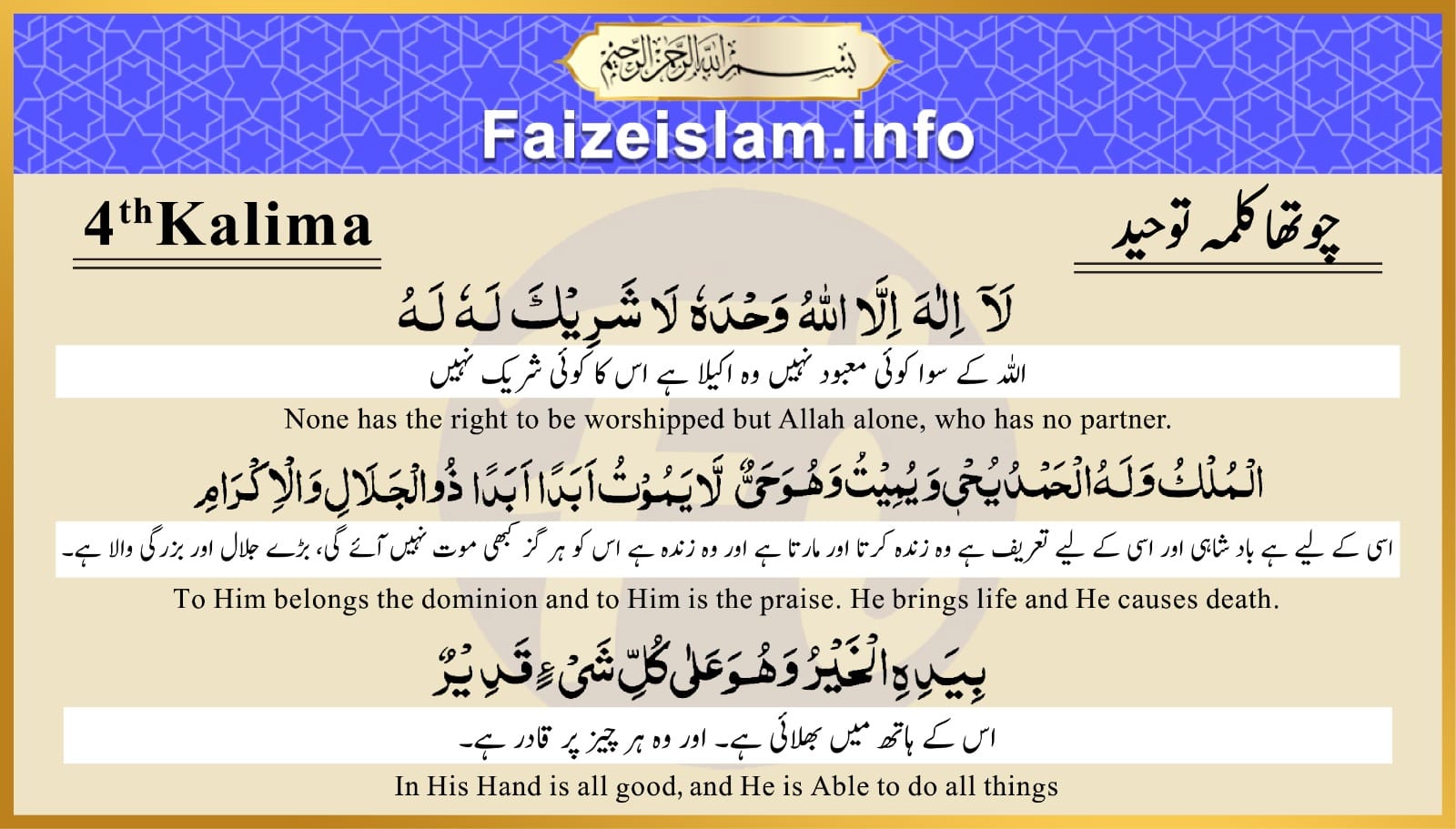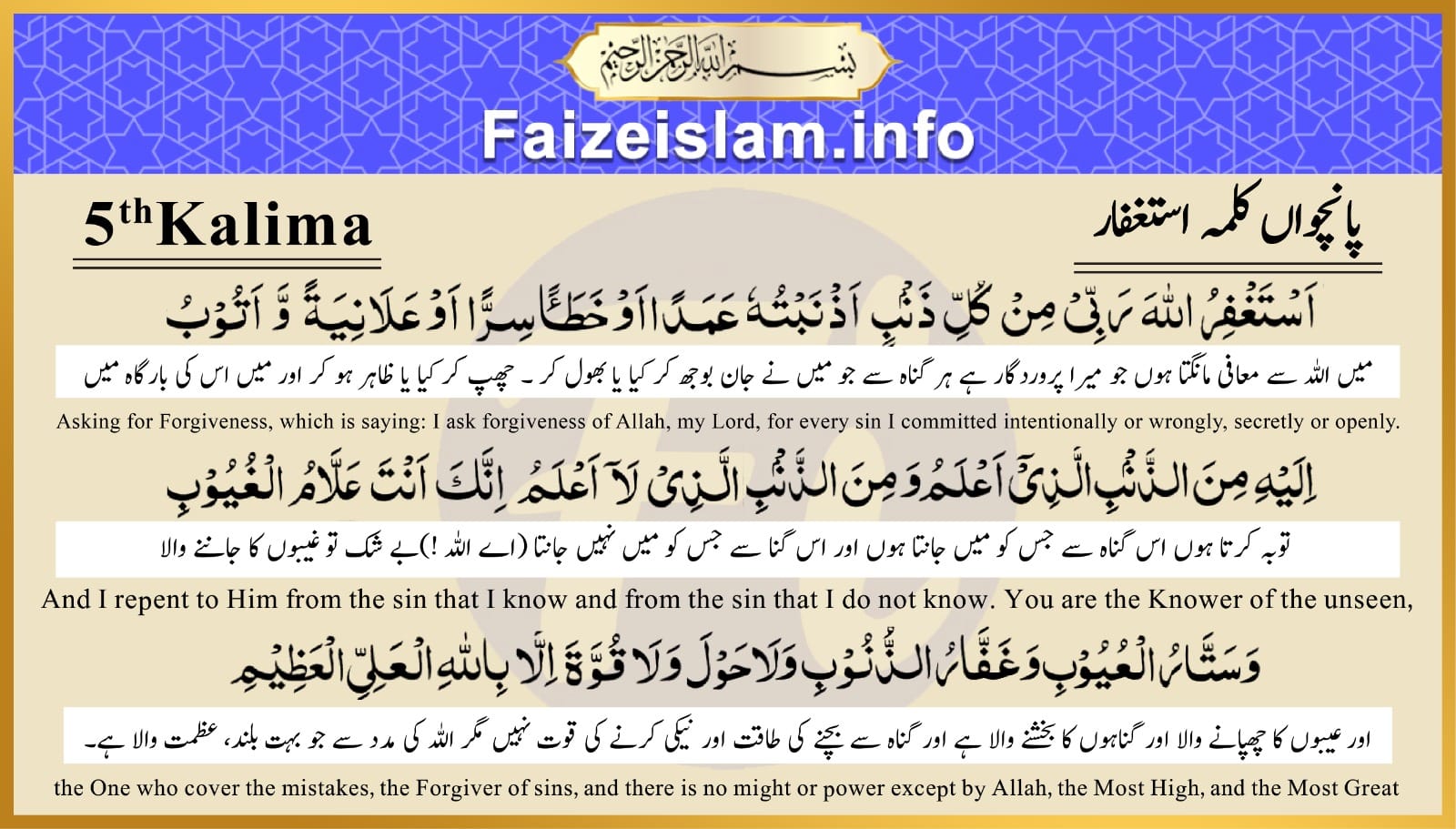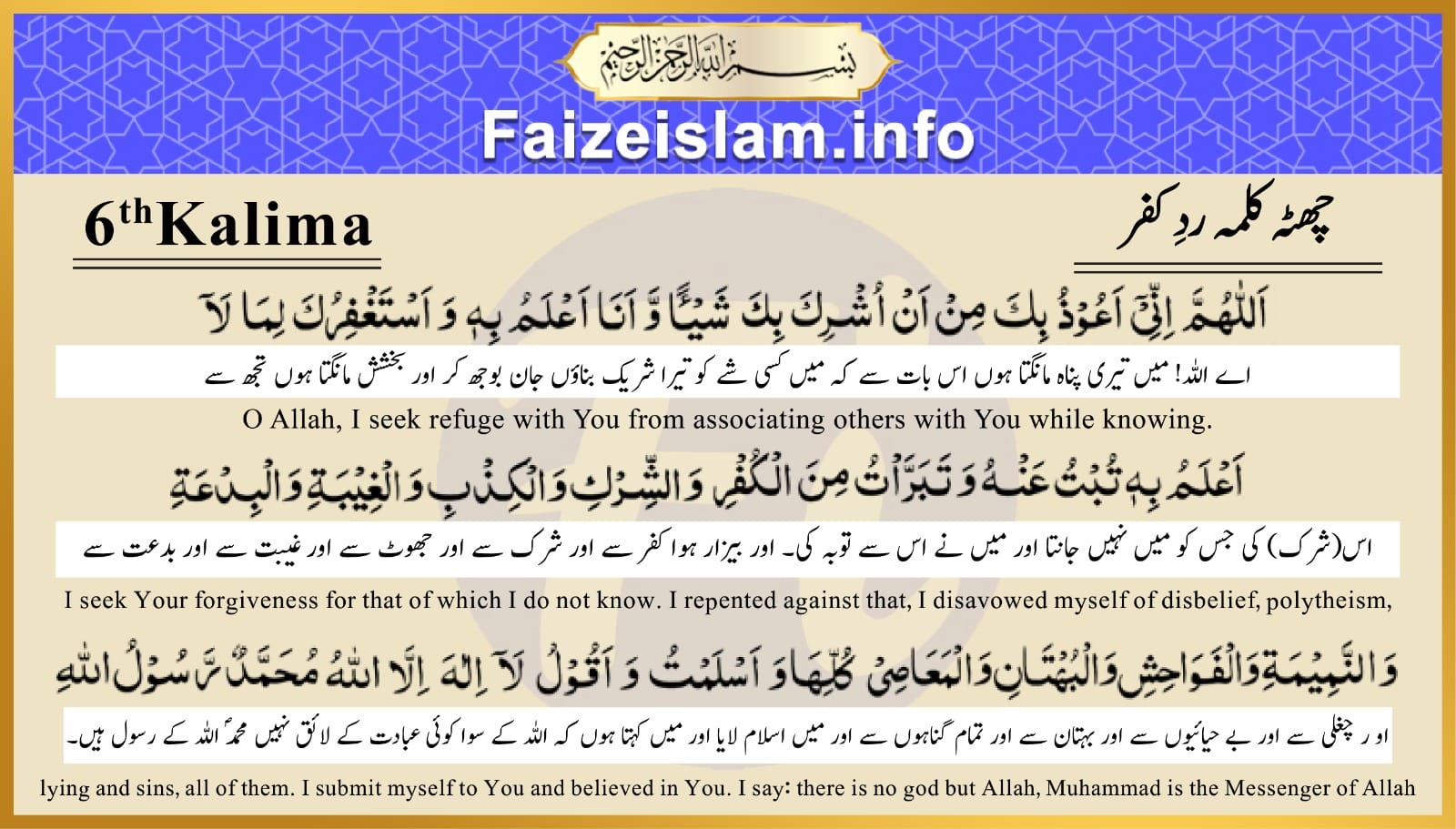Six Kalimas of Islam – Arabic Text, English & Urdu Translation
The Kalima, or Shahada, is Islam’s core belief: “La ilaha illallah, Muhammadur Rasoolullah” meaning there is no god but Allah, and Muhammad (SAW) is His Messenger. It affirms the Oneness of Allah and acceptance of the Prophet (ﷺ) as His final messenger.


Kalima Tayyibah
- First Kalima: Kalima Tayyab (The Word of Purity)
- Arabic: لَا إِلَٰهَ إِلَّا ٱللَّٰهُ مُحَمَّدٌ رَسُولُ ٱللَّٰهِ
- Transliteration: La ilaha illallah Muhammadur Rasulullah
- Translation: There is no god but Allah, and Muhammad is the Messenger of Allah.

Kalima Shahadat
- Second Kalima: Kalima Shahadat (The Testimony of Faith)
- Arabic: أَشْهَدُ أَنْ لَا إِلَٰهَ إِلَّا ٱللَّٰهُ وَحْدَهُ لَا شَرِيكَ لَهُ وَأَشْهَدُ أَنَّ مُحَمَّدًا عَبْدُهُ وَرَسُولُهُ
- Transliteration: Ashhadu alla ilaha illallahu wahdahu la sharika lahu, wa ashhadu anna Muhammadan ‘abduhu wa rasuluhu.
- Translation: “I bear witness that there is no god but Allah, the One alone, without partner, and I bear witness that Muhammad is His servant and Messenger.”

Kalima Tamjeed
- 3rtd Kalima: Tamjeed (Declaration of Glory)
- Arabic: سُبْحَانَ اللّٰهِ وَالْحَمْدُ لِلّٰهِ وَلَا اِلٰهَ اِلَّا اللّٰهُ وَاللّٰهُ اَكْبَرُ، وَلَا حَوْلَ وَلَا قُوَّةَ اِلَّا بِاللّٰهِ الْعَلِيِ الْعَظِيْمِ
- Transliteration: Subhanallahi walhamdu lillahi wala ilaha illallahu wallahu akbar, wala hawla wala quwwata illa billahil aliyyil azeem
- Translation:Glory be to Allah, and all praise be to Allah. There is no god but Allah, and Allah is the Greatest. There is no power and no strength except with Allah, the Most High, the Most Great.

Kalima Touheed
- Fourth Kalima: Kalima Tauheed (The Word of Unity)
- Arabic: لَا إِلَٰهَ إِلَّا ٱللَّٰهُ وَحْدَهُ لَا شَرِيكَ لَهُ، لَهُ ٱلْمُلْكُ وَلَهُ ٱلْحَمْدُ، يُحْيِي وَيُمِيتُ، وَهُوَ حَيٌّ لَا يَمُوتُ، أَبَدًا أَبَدًا، ذُو ٱلْجَلَالِ وَٱلْإِكْرَامِ، بِيَدِهِ ٱلْخَيْرُ، وَهُوَ عَلَىٰ كُلِّ شَيْءٍ قَدِيرٌ
- Transliteration: La ilaha illallahu wahdahu la sharika lahu, lahul mulku wa lahul hamdu, yuhyi wa yumitu, wa huwa hayyun la yamutu, abadan abada, dhul jalali wal ikram, biyadihil khair, wa huwa ‘ala kulli shay’in qadeer.
- Translation: “There is no god but Allah, alone without partner. To Him belongs the Kingdom, and for Him is all praise. He gives life and causes death, and He is alive and never dies. Everlasting and Eternal, the Possessor of Majesty and Honor. In His hand is all good, and He has power over everything.”

Kalima Astaghfar
- Fifth Kalima: Kalima Astaghfar (The Word of Repentance)
- Arabic: اَسْتَغْفِرُ ٱللَّٰهَ رَبِّي مِنْ كُلِّ ذَنْبٍ أَذْنَبْتُهُ عَمَدًا أَوْ خَطَأً سِرًّا أَوْ عَلَانِيَةً وَأَتُوبُ إِلَيْهِ مِنَ ٱلذَّنْبِ ٱلَّذِي أَعْلَمُ وَمِنَ ٱلذَّنْبِ ٱلَّذِي لَا أَعْلَمُ، إِنَّكَ أَنْتَ عَلَّامُ ٱلْغُيُوبِ وَسَتَّارُ ٱلْعُيُوبِ وَغَفَّارُ ٱلذُّنُوبِ وَلَا حَوْلَ وَلَا قُوَّةَ إِلَّا بِٱللَّٰهِ ٱلْعَلِيِّ ٱلْعَظِيمِ
- Transliteration: Astaghfirullah rabbi min kulli dhambin adhnabtuhu ‘amdan aw khata’an, sirran aw ‘alaniyatan, wa atubu ilaihi minadh dhambilladhi a’lamu wa minadh dhambilladhi la a’lamu, innaka anta ‘allamul ghuyubi wa sattarul ‘uyubi wa ghaffarudh dhunubi, wa la hawla wa la quwwata illa billahil ‘aliyyil ‘azeem.
- Translation: “I seek forgiveness from Allah, my Lord, for every sin I committed knowingly or unknowingly, secretly or openly. I turn to Him from the sins I know and those I do not know. Indeed, You are the Knower of the unseen, the Concealer of faults, and the Forgiver of sins. There is no power nor strength except with Allah, the Most High, the Great.”

Kalima Radde Kufr
- Sixth Kalima: Kalima Radd-e-Kufr (Rejection of Disbelief)
- Arabic: ٱللَّٰهُمَّ إِنِّي أَعُوذُ بِكَ مِنْ أَنْ أُشْرِكَ بِكَ شَيْئًا وَأَنَا أَعْلَمُ بِهِ وَأَسْتَغْفِرُكَ لِمَا لَا أَعْلَمُ بِهِ تُبْتُ عَنْهُ وَتَبَرَّأْتُ مِنَ ٱلْكُفْرِ وَٱلشِّرْكِ وَٱلْكِذْبِ وَٱلْغِيبَةِ وَٱلْبِدْعَةِ وَٱلنَّمِيمَةِ وَٱلْفَوَاحِشِ وَٱلْبُهْتَانِ وَٱلْمَعَاصِي كُلِّهَا وَأَسْلَمْتُ وَأَقُولُ لَا إِلَٰهَ إِلَّا ٱللَّٰهُ مُحَمَّدٌ رَسُولُ ٱللَّٰهِ
- Transliteration: Allahumma inni a’udhu bika min an ushrika bika shay’an wa ana a’lamu bihi, wa astaghfiruka lima la a’lamu bihi, tubtu ‘anhu wa tabarra’tu minal kufri washshirki walkizbi walghibati walbid’ati walnamimati walfawahishi walbuhtani walma’asi kulliha, wa aslamtu wa aqulu la ilaha illallah Muhammadur rasulullah.
- Translation: “O Allah, I seek refuge in You from associating partners with You knowingly, and I seek Your forgiveness for what I do unknowingly. I repent from it, and I reject disbelief, polytheism, lying, backbiting, innovation, slander, lewdness, false accusations, and all sins. I submit to You, and I declare: There is no god but Allah, Muhammad is the Messenger of Allah.”
What is the Kalima?
The Kalima is a declaration of faith that expresses belief in the oneness of Allah and the prophethood of Muhammad (ﷺ). It is the foundation of the Islamic faith.
History and Origin of the Six Kalimas
The Six Kalimas are derived from the Quran and Hadith, though they are not directly mentioned as a set in the primary Islamic scriptures. They were compiled by Islamic scholars over time to summarize core Islamic beliefs in an easy-to-memorize format.
Importance of the Six Kalimas in Islam
The Six Kalimas summarize key Islamic beliefs, affirming Allah’s oneness and Prophet Muhammad’s (ﷺ) finality. Reciting them strengthens faith and supports daily spiritual growth.
The Six Kalimas with Transliteration (For Non-Arabic Readers)
The Six Kalimas are a collection of essential Islamic declarations, prayers, and phrases that hold great significance in the life of a Muslim. These Kalimas serve as the foundation of faith (Iman), worship (Ibadah), and remembrance (Dhikr) of Allah (SWT). They are widely taught to Muslims from a young age, helping them strengthen their belief and connection with Islam. Each Kalima has a unique purpose, some affirm the Oneness of Allah, others seek forgiveness, and some praise the Prophet Muhammad (PBUH). Memorizing and reciting them daily brings spiritual benefits and reinforces Islamic teachings.
Final Words
The Six Kalimas (6 Kalimas) are a vital part of a Muslim’s spiritual life, serving as declarations of faith, repentance, and devotion. By learning and reciting them regularly, Muslims can strengthen their Iman (faith), seek forgiveness, and maintain a strong connection with Allah (SWT). Whether you are a new Muslim, a parent teaching your children, or someone looking to deepen your Islamic knowledge, memorizing these Kalimas will bring immense blessings and protection in this life and the Hereafter.
